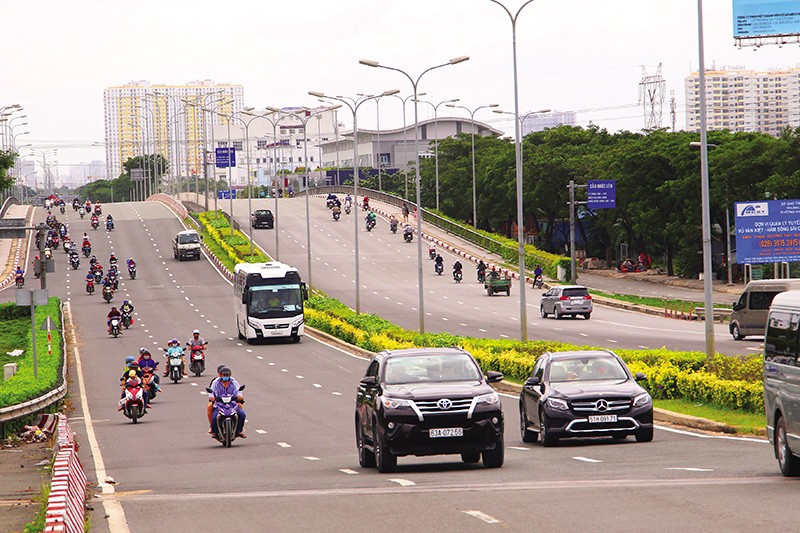
After the ASEAN Smart Cities Network (ASCN) was launched in Singapore in April last year, Hanoi, Danang, and Ho Chi Minh City, which have been selected to join the ASCN, have been actively seeking effective solutions to transform themselves in alignment with smart trends. According to the Ministry of Construction, this is laying firm groundworks for Vietnam to develop smart cities on a larger scale in the future.
Hanoi Department of Information and Communications (DIC) reported that in its journey to become a smart city, this year Hanoi will co-operate with partners to pilot 5G, in addition to expanding the application of IT solutions in parking and the supervision of the operation of buses via GPS and e-tickets.
Next year, Hanoi will begin creating a scheme to develop itself into a smart city by 2025 with an orientation towards 2030, establishing its own smart monitoring centre.
The facility will include eight sub-centres focusing on information security, support for IT experts, media information management, transport supervision and monitoring, data analysis, response to public requirements, public service management, and fire prevention, as well as healthcare issues.
“Hanoi will also deploy smart projects regarding healthcare, education, the environment, agriculture, and on urban areas,” stated a report from Hanoi’s DIC.
According to Danang’s equivalent, after the ACCN was launched, the city has been actively deploying a series of programmes and projects to make itself smarter.
Late last year the municipal People’s Committee approved a scheme to develop Danang into a smart city in 2018-2025, with an orientation towards 2030. The scheme will cost VND2.14 trillion ($93 million) of which VND650 billion ($28.3 million) will come from the state budget, and the remainder will be from private sources. This May, the committee enacted a plan to carry out the scheme until next year.
“Currently all departments and agencies in the province are preparing procedures for investing into key projects in 2020, especially projects to upgrade the city’s data centre, expand the city’s telecommunications system, construct a system for environmental monitoring, and to build up an urban database.
The city is now also implementing the application of IT in the transport sector, and co-operating with FPT Group to deploy an online transport portal in the city. It is also about to develop a VND550 billion ($23.9 million) project to install smart cameras on all streets and roads.
Danang is also going to develop a smart water management system, with an investment of VND15 billion ($650,000) during 2021-2025.
Meanwhile, after 18 months of implementing its smart city action plan following the ASCN, Ho Chi Minh City has achieved results.
Specifically, according to the city’s DIC, Ho Chi Minh City has built a shared data warehouse and developed an open data ecosystem. The warehouse’s first phase has been operating at Quang Trung Software Park on the basis of integrating existing databases, such as electronic one-stop, complaints and denunciations, business registration, foreign direct investment, taxpayers, foreign labour, and more.
Moreover, the country’s largest city has built an intelligent operations centre on the basis of camera integration and the application of some video analytic functions. Besides that, Ho Chi Minh City has also started developing an e-portal for providing information and responding to public requests, which allow citizens and enterprises to send feedback, report on public infrastructure incidents and public transportation systems, and comment and contribute to public services via different methods such as voice calls, SMS, mobile apps, websites, and social networks.
Ho Chi Minh City People’s Committee has also built an e-government architecture which serves the digital transformation process, aiming to build digital government to manage and operate a smart city.
The ASCN was launched at the 32nd ASEAN Summit in 2018. Under the initiative, smart city development covers many sectors including transport, water quality, energy, healthcare, education, public services, data, and ICT. A total of 26 cities in Southeast Asia have joined the ASCN.
The Vietnamese trio will be linked up with private sector solution providers to kick-start practical and commercially-viable projects with tangible outcomes. They will also pair up with specific external partners on a voluntary basis, and form mutually beneficial partnerships to drive smart city development.
“The cities have taken concrete steps to harness smart solutions in various domains,” said Lim Teng Leng, deputy director of the Centre for Liveable Cities under Singapore’s Ministry of National Development.
“Already, Hanoi’s iParking app makes vacant parking lot information available at drivers’ fingertips, and allows them to pay for parking with just a few clicks. Danang has also made use of data to assess climate change risks and shape its strategies in a data-informed manner,” he said
According to him, many cities in Vietnam also have greater visions. “They have put forth innovative solutions and ambitious plans for the near future, such as Danang’s intelligent traffic control system to reduce congestion and improve logistical efficiency, and Ho Chi Minh City’s Integrated and Unified Emergency Response Centre to centrally co-ordinate and respond to emergency situations.”


















